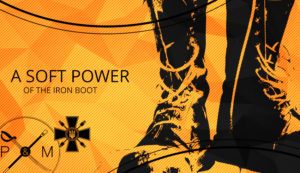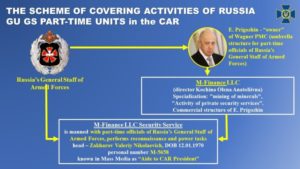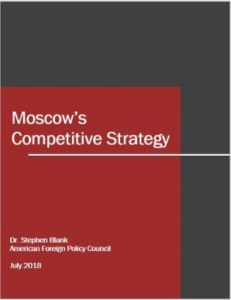Russia lacks China’s muscle when it comes to trade and infrastructure. But it has other assets. One is a shrewd appreciation of the political needs of African dictators, another is skills, honed at home, in dirty tricks, analyst Edward Lucas writes for The (London) Times:
A leading force here is the Wagner Group, prominent in the wars in Syria and Ukraine, and associated with Yevgeny Prigozhin, an oligarch close to the Kremlin who denies US prosecutors’ claims that he masterminded interference in the 2016 US presidential election. The costs are low and the gains high. The Russian state gains diplomatic support at the UN, a bigger military footprint and means of evading sanctions. Russian companies (and individuals) get rich. Everybody, except Africans suffering misery and misrule, is happy.
Some details of Russian undercover activities were disclosed earlier this year in leaked documents published by an investigative unit funded by the émigré tycoon Mikhail Khodorkovsky, Lucas adds. These involve at least 13 African countries. A separate BBC investigation in April highlighted the activities of dozens of mysterious Russians who doled out cash and brokered deals in Madagascar’s presidential elections (see above).
 “A Soft Power of the Iron Boot” is how one analysis characterizes the Kremlin’s hard-edged influence operations.
“A Soft Power of the Iron Boot” is how one analysis characterizes the Kremlin’s hard-edged influence operations.
After meddling in the 2016 American election, Russia is using similar tactics in the Central African Republic. But as it sows political chaos, this time it is also seeking diamonds. As in the American election, the battle for control over the country is also being fought in the media and on social media, The New York Times reports:
As Russian mercenaries connected to Mr. Prigozhin were streaming into the nation, Facebook sites were popping up with pro-Russian themes, showing photographs of local residents in T-shirts bearing a giant red heart and the slogan “Russia 2018.”

belsat.eu
Other soft-power tactics have helped the Russians build, and potentially profit from, deepening ties. Billboards sprouted around the capital, Bangui, with pictures of local soldiers under a Russian flag. A mining company linked to Mr. Prigozhin has built hospitals and slaughterhouses, sponsored a soccer tournament and held a “Miss Centrafrique” beauty contest. It created a Russian-focused radio station, with a broadcast range that reached farther than state radio….
In Europe and the United States, Russia has used hacking, disinformation and other strategies to try to penetrate and destabilize Western democracies. But here in the Central African Republic, analysts say, it appears to have a different goal: asserting its global importance and reaping the financial rewards.
 As the United States has pulled away from engaging Africa, withdrawing troops and offering no broad policy agenda, Russia has pushed hard into the continent, expanding its presence in unstable nations with abundant natural resources, The NY Times adds:
As the United States has pulled away from engaging Africa, withdrawing troops and offering no broad policy agenda, Russia has pushed hard into the continent, expanding its presence in unstable nations with abundant natural resources, The NY Times adds:
Several countries south of the Sahara have asked Russia for help with security. In May, Russia announced it would send military specialists to the Democratic Republic of Congo. In Guinea, a former Russian ambassador who praised the country’s president — backing a constitutional change to allow him to run for a third term — was recently named head of a major Russian aluminum company operating there. Mr. Putin has announced the first Russia-Africa summit in October in Sochi.
“They’re collecting friends and allies, and they’re finding permissive environments to sell their wares and gain commercial opportunities,” said Judd Devermont, director of the Africa Program at the Center for Strategic and International Studies. “They are using the U.S. retreat to present themselves as a global power.”

CSIS
Roughly a year ago three Russian journalists and filmmakers were mysteriously murdered in the Central African Republic (CAR). The victims, Orkhan Dzhemal, Alexander Rastorguev and Kirill Radchenko, had traveled to the CAR to make a documentary about the “Wagner Group,” notes analyst Mariam Kiparoidze. A new piece in The Daily Beast last week examines the most recent investigation into the murders, conducted by Dossier Center, an investigative unit funded by Khodorkovsky, she writes for Coda Story:
For the report, the investigating team has conducted new interviews, studied billing records, transportation and communications data and concluded that the journalists had been surveilled, set up and “the murders were deliberate and professionally executed.” The report also says that a Prigozhin-backed disinformation campaign was then mounted to impede any independent investigation.
“The involvement of a number of Russian citizens, in particular, employees of companies affiliated with Yevgeny Prigozhin, is being concealed or denied,” concludes the report.







